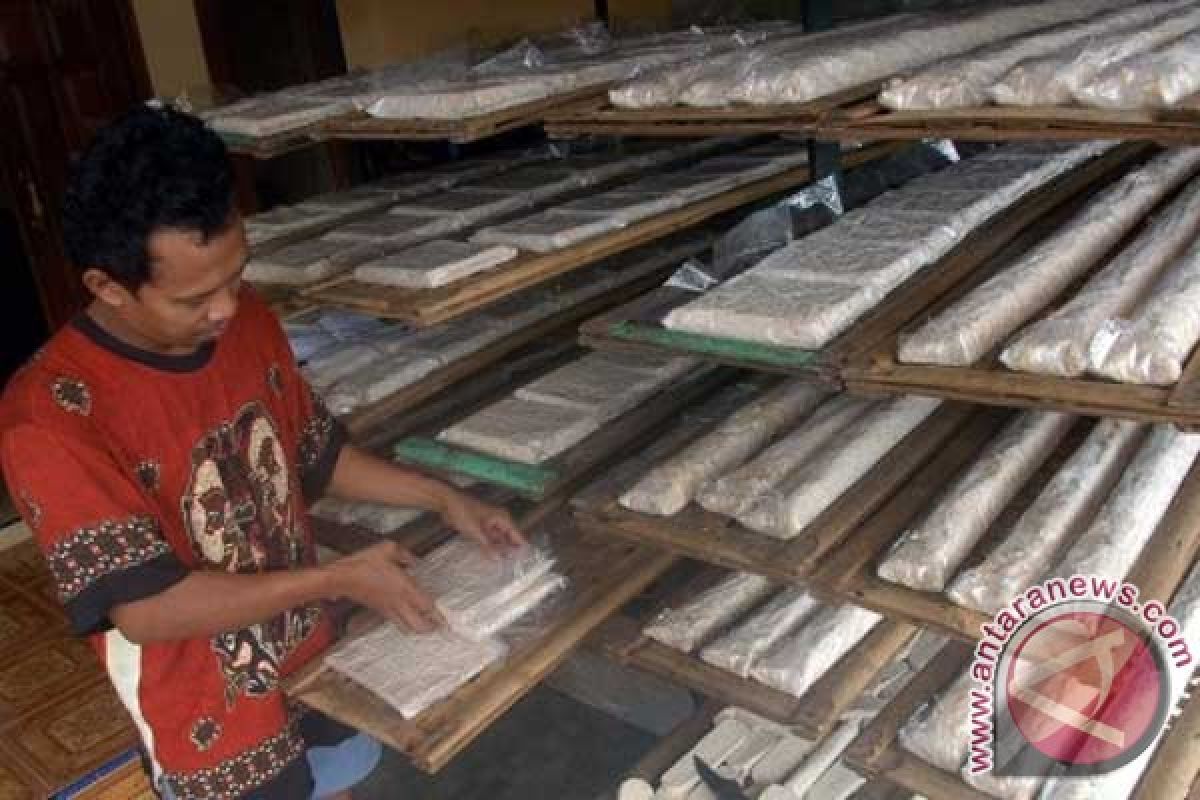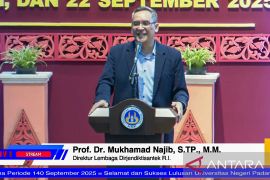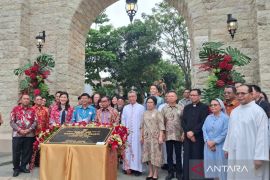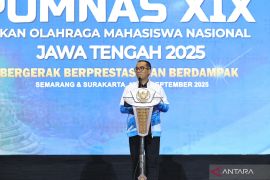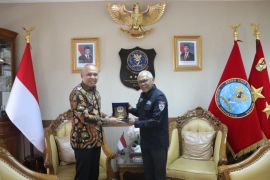"The agriculture minister should identify the root of the problem. The government should be transparent in this matter," Deputy Chairman of the House of Representatives` Commission IV Herman Khaeron said.Jakarta (ANTARA News) - The impact of global warming is real on the dining tables of most Indonesians who love eating tofu and tempe (fermented soybean cake).
Tempe and tofu, favorite food of many Indonesians, reportedly disappear from markets following a strike by tempe and tofu producers to protest the price hike of soybean, the basic material for making tempe and tofu.
At present the soybean price reaches Rp8,000 per kg, or an increase of 30 percent from Rp6,000 per kg previously. The price hike was triggered by a drop in US soybean production this year due to the prevailing drought conditions there. Around 60 percent of Indonesia`s soybean imports are from the United States.
"This (the drought in the US) has caused a rise in the soybean prices in Indonesia," Deputy Chairman of the House of Representatives` Commission IV Herman Khaeron noted on Wednesday.
The domestic demand of soybean has reached approximately 2.25 million tonnes per quarter, while Indonesia produces only 779,000 tonnes of soybean per quarter.
"There was a shortage of around 1.4 million tonnes per quarter, which was met by importing soybean from the United States," Herman explained.
However, Trade Minister Gita Wiryawan reportedly said in Pasuruan, East Java, Tuesday that the domestic consumption of soybean reaches 2.6 million tons annually, while the national production of soybean is only 6,000 tons/year.
"So, we have to import soybean to meet the shortage," Minister Wiryawan said.
The minister also confirmed that the current soybean price hike is due to the climate anomaly in the producing countries, particularly in the US.
He hoped that the climate anomaly would stop so the soybean price hike would not continue.
Hery Budiarto, a producer of tofu and tempe (soybean cake) in Pasuruan, said the soybean price has increased over the past several days from Rp6,800 per kg to Rp7,500 per kg now.
He has to raise the price of his products, for instance, tofu from Rp500 per piece to Rp650. Due to the price hike, the tofu and tempe sales have decreased by around 40 percent, he said.
In January 2007, the soybean price was Rp2,450 per kg. However, in November 2007, it increased to Rp5,450 per kg, in December 2007, to Rp6,950 per kg, and in January 2008 to Rp7,250 per kg. And now the price reaches its record high of Rp8,000 per kg in several regions.
To protest the price hike, tofu and tempe producers in Jakarta, Bogor, Tangerang, Bekasi, and Bandung have decided to halt production for three days, which started on Wednesday (July 25).
The strike is aimed as a protest against the government, which has failed to control soybean prices, and also to inform the public that the traders had no option but to increase the prices of tofu and tempe, since the soybean price increased significantly.
In Tangerang, Banten Province, around 5,000 producers of tofu and tempe (soybean cake) in Tangerang, Banten Province, halt tofu and tempe production starting Wednesday.
Chairman of the Tangerang Tofu and Tempe Cooperatives Asep Hidayat urged the government to return the soybean price to the previous one, or otherwise many tofu and tempe producers could go bankrupt due to the price hike.
The government should monitor the prices of not only basic necessities such as rice, sugar, eggs and cooking oil, but also soybean because tempe and tofu are consumed by most Indonesian people, especially on Java Island, the world`s most populous island with over 100 million people.
Tofu and tempe producers and sellers in Bogor City, West Java, also joined the three-day strike called by Primkopti (the Association of Indonesian Tempe and Tofu Cooperatives).
Several Primkopti members inspected the Anyar, Merdeka and Warung Jambu traditional markets in Bogor to make sure that all tofu and tempe traders complied with the strike call.
Tofu and tempe (soybean cake) producers in Pekalongan, Central Java Province, threatened to join the strike. Bambang Sujatmiko, the chairman of the Association of Pekalongan tofu and tempe producers, said here Wednesday that around 30 members of the association are considering to stop production temporarily because soybean is hard to find and very expensive.
If the soybean price hike continues, tempe and tofu producers might not be able to make profit, he stated.
The tempe and tofu producers did not increase the tempe and tofu prices despite the soybean price hike because they are afraid that buyers would not understand the problem.
He called on the government to help stabilize the tempe and tofu prices. Faiki, a tempe producer, said the soybean price hike has so far caused the producers in Pekalongan to "scream".
"The soybean price currently is Rp8,000 per kg, while it was only Rp5,500 per kg three months ago. If such a condition persists, tofu and tempe producers in Pekalongan will go bankrupt," he said.
Sutaryo, the second chairman the Association of Indonesian Tofu and Tempe Producers Cooperatives (Gakoptindo) said on Tuesday that "The producers won`t mind a price hike if it`s in stages. But what`s happening now, the price hike is not normal. The agriculture minister should have supported the government`s policy to improve the welfare of farmers and protect the interests of producers and consumers."
He urged the government to exempt soybean imports from tax and create an instrument to stabilize soybean prices. He also asked the government to help realize self-reliance in soybean production in the long run.
"Depending on soybean imports is risky. However, the government has hardly done anything to reach soybean production self-reliance by 2014," he said.
The tempe and tofu producers` strike and "scream" were quite successful to force the government to listen to their demands, as Agriculture Minister Suswono finally announced the government will waive soybean import duty in an effort to reduce the imported soybean prices.
"I think this is in response to the emergency situation, due to the soybean price hike," the minister said after attending a limited coordination meeting on food security in Jakarta on Wednesday.
"The reduction of soybean import duty from 5 percent to 0 percent is temporary and will apply until the end of this year at the latest. Later, a tariff team led by the finance ministry will decide on the rate," Suswono added.
The country needs at least 500,000 hectares of land to plant soybean in order to meet domestic demand, but farmers prefer to grow maize because it is more profitable.
"Our problem regarding soybean is land-related. From the beginning, I have always said we need at least 500,000 hectares of additional farmland in order to be self-sufficient in soybean," Suswono stated.
"The country has 7.2 million hectares of land that is yet to be used," he pointed out.
The agriculture ministry has coordinated with the National Agrarian Agency to provide more land for soybean farming, through which an additional 1.1-1.5 million tonnes of soybean can be produced.
Another response come from State Enterprise Minister (BUMN) Dahlan Iskan who said state-owned enterprises will produce soybean, maize, sorghum, and sago from next year onwards.
"BUMN has helped improve the country`s food security by producing rice and sugar and developing cattle husbandry so far," Dahlan said on Wednesday.
State enterprises are now also being encouraged to produce soybean in the wake of a shortage in supply of soybean, he said.
All those promises and plans announced by the government are being closely monitored by the Parliament, according to Deputy Chairman of the House of Representatives` Commission IV Herman Khaeron.
"President Yudhoyono has instructed the trade and agriculture ministers to immediately deal with the soybean price rise that has affected the production of tempe and tofu," said Herman, who is from the Democratic Party, on the phone on Wednesday.
Herman stated that the price hike issue needed to be dealt with urgently in the light of Idul Fitri festivities.
"The agriculture minister should identify the root of the problem. The government should be transparent in this matter," he said.
He also urged the government to provide more land for soybean farming in order to boost production and make Indonesia self-sufficient in soybean. (*)
Reporter: Fardah
Editor: Heru Purwanto
Copyright © ANTARA 2012
